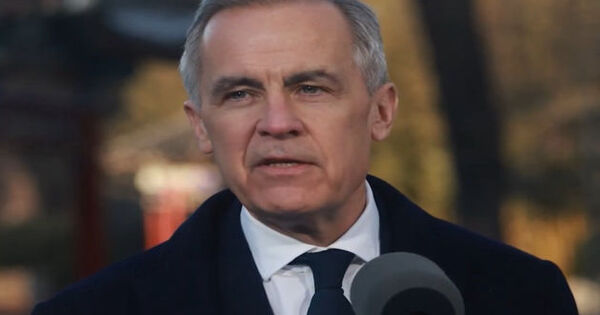
Latest Spanish News In English

Confirmed by the company—Target commits to artificial intelligence and new stores following Brian
PUBLISHED: 2026-01-20 03:00:17Changes are coming to Target. Michael Fiddelke will take over as the new CEO, and the company plans to renovate its stores. Brian Cornell has led the retail giant for the past 11 years, having assumed the role in August 2014, so the generational shift is now more than evident. Among the upcoming changes is the integration of artificial intelligence to optimize product availability, personalize offers, and improve logistics, among other things. “No one is better suited to lead Target forward than Michael Fiddelke,” Cornell recently stated.
Target will incorporate advanced technology and artificial intelligence
By 2026, technology will be more present than ever in people’s daily lives. This is not only because we’ll have access to cutting-edge technology, but also because large companies are implementing advanced technology in their daily operations. Target, for its part, will incorporate advanced technology and artificial intelligence, and according to the company, this is in response to consumers who increasingly demand speed and new experiences. “By leveraging AI to capture color, material, style, and product details and applying consumer research in our brand principles, we can deliver unique and on-trend products to our guests faster than ever before,” Fiddelke said. In addition, Target also intends to strengthen its own brands and invest in technology to offer a more modern and personalized shopping experience.
The company will also review external partnerships, such as ending its collaboration with Ulta Beauty
Target is betting on brands like Good & Gather and Cat & Jack. According to Cornell, regarding the new CEO, “He brings remarkable determination to complex challenges, a deep passion for growth, and a natural ability to inspire those around him to shape the future.” The company will also review external partnerships, such as ending its collaboration with Ulta Beauty, to focus its offerings on its own beauty and personal care categories, as reported by Modern Retail. However, Fiddelke has not yet provided details on any specific new product launches for this year.
“Target’s best days are yet to come” �' Michael Fiddelke
The fact is that restructuring certain models is necessary. And cycles are a reality, especially in a market as volatile as retail. A market that has also faced digitalization and the rise of online shopping. Specifically, the retailer recently faced financial results with which executives were far from satisfied. Nevertheless, Fiddelke emphasized that Target is a “design-driven company that succeeds by combining an amazing product with an amazing experience” and believes that “Target’s best days are yet to come.”
The goal is to create a smoother customer experience
The online sales reforms are especially important given the current climate. These improvements aim to streamline digital order management and provide a more welcoming in-store shopping experience. The goal is to create a smoother, more enjoyable customer experience that encourages repeat business at Target. Therefore, same-day delivery and pickup are being enhanced, and restocking out-of-stock items will be faster, according to the company.
2026 is coming with the addition of at least 43 new stores in 23 states
For now, the goals are ambitious. The company has unveiled major investment plans for 2030, including more store openings, digital enhancements, and expansion of its Target Plus platform. Among other things, Fiddelke is planning renovations this year for both its online and physical store operations. With AI, for example, they’ll be able to identify future trends to stay ahead of the curve. This will also allow them to better track social media trends to find products that resonate most with Target customers. Finally, the company is significantly expanding its reach by 2026 with the addition of at least 43 new stores in 23 states. In short, the changes are beginning at Target. New year, new Target.

Confirmed by mechanics and manufacturers—tap water damages the windshield wiper system over time
PUBLISHED: 2026-01-19 23:30:43Although most people own a car, not everyone knows all the ins and outs of automobiles. One of the most frequently used functions is precisely where drivers tend to make the most mistakes. Experts remind us that putting tap water in the windshield washer fluid is not a good idea. It’s best to use a suitable fluid to prevent a sludge from forming inside the reservoir, which can then clog the windshield washer system.
Another way to do it is to add a generous amount of dish soap, as it usually has a higher concentration
Experts recommend researching thoroughly before modifying car parts that may be more sensitive than others, as is the case here. One of the simplest methods, and also one of the most common among drivers, involves combining two parts water with one part windshield washer fluid, for example. The reason is that modern car windshield washer systems are a network of pumps, nozzles, hoses, and sensors that are not designed to operate with untreated water, so using tap water should not be an option. In fact, another way to do it is to add a generous amount of dish soap, as it usually has a higher concentration. The point is that, depending on where drivers live, tap water can contain minerals and other substances that accumulate in the system, affecting its performance.
So, before embarking on a trip, this is one of the things to check on your vehicle. It’s also recommended to check tire pressure, brakes, lights, and so on. Regarding windshield washer fluid, it’s important to keep in mind that simply checking and filling it isn’t enough; it’s best to carry extra fluid in case you need it along the way. Another drawback of using tap water is that in winter, problems can multiply when the water freezes, blocking the flow and making components vulnerable to damage. That’s why experts also recommend adding a few drops of dish soap to help reinforce the degreasing effect. The right windshield washer fluid, which is more complex than you might think, is designed to prevent these problems. In other words, simply using tap water isn’t enough, as over time it could lead to limescale deposits and blockages in the car’s system.
The right mixture of distilled water, liquid dish soap, and white vinegar is sufficient for the warmer months
On the other hand, while ordinary water freezes at 0°C (32°F), some winter windshield washer fluids can remain liquid until the temperature drops to 4°C (40°F). Therefore, it’s recommended that the fluid include degreasing and antifreeze components, which will require adding certain products to the washer water. Avoiding a cold-weather solution and using tap water could cause freezing blockages, preventing the fluid from reaching the windshield.
Experts know that, for most people, using tap water in windshield washer fluid is the cheapest option, but they warn of the consequences. They also offer ideas for avoiding the need to buy a specific fluid if your budget is tight. Alternatives like those mentioned above are a good solution. The right mixture of distilled water, liquid dish soap, and white vinegar is sufficient for the warmer months. Using other methods risks damaging the system’s components, as water expands by 9% when it freezes. The reservoir, pump, and pipes aren’t designed for that extra volume, increasing the risk of cracks or leaks. Therefore, you can add the appropriate amount of isopropyl alcohol to the water, which can prevent the homemade windshield washer fluid from freezing.
Ultimately, if money is the issue, there are inexpensive options using common household items without jeopardizing your vehicle or your family’s finances. In any case, if you have any doubts, it’s advisable to consult a mechanic or expert to avoid causing further, more costly damage.

U.S. FAA flags airspace risks amid Latin America tensions
PUBLISHED: 2026-01-20 00:00:00WASHINGTON, D.C.: U.S. aviation regulators have issued new safety warnings for airlines operating across parts of Latin America, cautioning that heightened military activity and navigation disruptions could pose risks to civilian flights.
The Federal Aviation Administration said this week it had alerted airlines to exercise caution when flying over Mexico, Central America, and sections of South America, citing concerns about potential military actions and GPS interference.
The FAA said it issued Notices to Airmen covering Mexico and Central American countries, as well as Ecuador, Colombia, and portions of airspace over the eastern Pacific Ocean. The warnings took effect on Friday and will remain in place for 60 days.
The advisory comes amid escalating regional tensions following a series of actions by the Donald Trump administration. The United States recently carried out a significant military buildup in the southern Caribbean, launched an attack on Venezuela, and seized President Nicolas Maduro in an army operation. Trump has also raised the possibility of additional military actions in the region, including against Colombia.
Last week, Trump said drug cartels were running Mexico and suggested the United States could strike land targets to combat them, adding to a series of threats to deploy U.S. military force against criminal groups operating in the region.
Mexico responded to the FAA advisory by stressing that it was precautionary and did not impose any restrictions on Mexican airspace or airlines. The notice applies only to U.S. operators, and aviation operations in Mexico remain unaffected, Mexico's transport ministry said in a statement.
The FAA has previously taken similar steps following military operations in the region. After the attack on Venezuela, the agency restricted flights throughout the Caribbean, leading to the cancellation of hundreds of flights by major airlines.
FAA Administrator Bryan Bedford told Reuters this week that there had been strong coordination between the aviation regulator and the U.S. military ahead of the Venezuela operation.
Concerns about airspace safety were underscored last month when a JetBlue passenger jet flying to New York took evasive action to avoid a mid-air collision with a U.S. Air Force tanker near Venezuela. JetBlue Flight 1112 had departed Curaçao and was flying about 40 miles off Venezuela's coast when the Airbus aircraft reported encountering the military jet, which did not have its transponder activated.

Canada, China look to reset ties; tariffs on Chinese EVs slashed
PUBLISHED: 2026-01-20 00:00:00BEIJING, China: Prime Minister Mark Carney announced that Canada will slash tariffs on electric vehicles as the country looks to forge new strategic ties with China.
Carney is the first Canadian prime minister to visit China since 2017, following months of diplomatic efforts. He is seeking to rebuild ties with his country's second-largest trading partner, after the United States.
Former Prime Minister Justin Trudeau had imposed a 100 percent tariff on Chinese electric vehicles in 2024, following similar U.S. penalties. In 2023, China exported 41,678 EVs to Canada.
Canada will initially allow up to 49,000 Chinese electric vehicles to enter on a 6.1 percent tariff under most-favoured-nation terms, Carney said after talks with Chinese leaders, including President Xi Jinping.
\"This is a return to levels prior to recent trade frictions, but under an agreement that promises much more for Canadians,\" Carney told reporters. He later said the quota would gradually increase to about 70,000 vehicles in five years.
\"For Canada to build its own competitive EV sector, we will need to learn from innovative partners, access their supply chains, and increase local demand,\" Carney said, turning away from Trudeau's rationale that tariffs were needed to protect domestic producers against subsidised Chinese manufacturers.
Relaxing electric-vehicle tariffs went against U.S. policy, and some members of President Donald Trump's cabinet criticised the move ahead of a planned review of the U.S.�'Canada�'Mexico trade deal. However, Trump himself voiced support for Carney, saying it was good for him to pursue a trade agreement with China.
Ontario Premier Doug Ford, whose province is Canada's main auto-manufacturing hub, condemned the deal. He said the federal government was allowing an influx of low-cost Chinese electric vehicles without firm guarantees of equal or immediate investment in Canada's economy, auto sector, or supply chains.
In response to earlier Canadian tariffs under former prime minister Justin Trudeau, China imposed tariffs in March on more than US$2.6 billion worth of Canadian farm and food products, including canola oil and meal, and later added tariffs on canola seed in August. As a result, China's imports of Canadian goods fell by 10.4 percent in 2025.
Under the new agreement, Carney said Canada expects China to reduce tariffs on canola seed to about 15 percent by March 1, down from the current 84 percent. He added that anti-discrimination tariffs on canola meal, lobsters, crabs, and peas are also expected to be lifted from March 1 until at least the end of the year. Carney said the deals could generate nearly $3 billion in export orders for Canadian farmers, fishers, and processors.
China's Commerce Ministry said it was adjusting anti-dumping measures on canola and anti-discrimination measures on some Canadian agricultural and seafood products in response to Canada lowering EV tariffs.
Carney also said Chinese President Xi Jinping had committed to visa-free travel for Canadians to China, though no details were provided. According to China's state-run Xinhua news agency, both countries agreed to restart high-level economic and financial talks, expand trade and investment, and strengthen cooperation in agriculture, oil, gas, and green energy.
Carney said Canada plans to double its energy grid over the next 15 years and sees opportunities for Chinese investment, including in offshore wind. He also said Canada is expanding liquefied natural gas exports to Asia and aims to produce 50 million tonnes of LNG annually by 2030, all for Asian markets.

Rosi retires after 50 years at the helm of Panadería Francisco in Torremolinos, one of the best bakeries in Spain
PUBLISHED: 2026-01-19 10:27:47Rosi Rey González has hung up her apron after 50 years at the helm of Panadería Francisco, a business that was named after her father and which she has run since she was 18 years of age. Together with her husband, Salvadora, Rosi started out in the flour trade in Churriana, where she was born. However, as her mother was from Torremolinos and, in the 1970s, after getting married, “the town was at its peak”, during the golden age of tourism, so the family eventually moved to the Costa del Sol town.From Churriana to TorremolinosAt that time, while still just a young girl, Rosi began learning the trade. As she was “the eldest of the younger ones”, that is, the daughter born in the middle of the family’s five siblings, she took charge of the bread shop they opened. At first, at the age of 18, as they did not yet have an oven, she brought the bread over from Churriana. “I used to go in my van, a Mercedes, in which I almost had to stand up to drive, and it really caught people’s attention,” she says. Eventually, together with her siblings Javier and Silvia, she opened the bakery as everyone knows it today, in Calle Europa.“I used to go in my van, a Mercedes, in which I almost had to stand up to drive, and it really caught people’s attention”“No Sundays off, no holidays, no fixed hours �' that’s what family businesses are like. When my father stepped back at 77, the three of us had to keep it going,” she explains. Although she admits to never having the chance to do things she has only recently begun to enjoy, such as going to the beach during the day, she also acknowledges that his work has been her passion �' a love of bread, which, she notes with pride, has earned them an Estrellas Dir-Informática award, the Michelin star of bakeries, among other accolades and recognitions.“No Sundays off, no holidays, no fixed hours �' that’s what family businesses are like. When my father stepped back at 77, the three of us had to keep it going”A whole lifetime behind the counter, during which they have witnessed the evolution of the El Calvario neighbourhood: this was a real “festivity” when the street market was held next to what is now the health centre, and a chance to learn, thanks to the “guiris”, who asked them for unusual breads that are still popular today. A career, they point out, built on a very loyal clientele, whose support they have repaid by collaborating, whenever possible, with local causes and institutions.The mayor (c) during her visit to the bakery to congratulate Rosi.This close connection with Torremolinos and a prominent role within its traditional businesses have led the mayor, Margarita del Cid, on behalf of the town hall, to visit the bakery in recognition of her work.“Rosi, who owns Panadería Francisco together with her siblings, is retiring after 50 years of sweetening our lives. That is why we wanted to surprise her and thank her for her professionalism, warmth and the friendliness that defines her. I hope you enjoy this new stage of your life. Thank you for the affection with which you have always looked after the people of Torremolinos,” said the mayor, addressing the daughter of Francisco and Salvadora, who began kneading bread and pastries when she was still just a child.

Capturados más de 80 terroristas de Estado Islámico que se habían fugado de una prisión en Siria
PUBLISHED: 2026-01-20 02:29:19If you wish to opt-out of the sale, sharing to third parties, or processing of your personal or sensitive information for targeted advertising by us, please use the below opt-out section to confirm your selection. Please note that after your opt-out request is processed you may continue seeing interest-based ads based on personal information utilized by us or personal information disclosed to third parties prior to your opt-out. You may separately opt-out of the further disclosure of your personal information by third parties on the IAB’s list of downstream participants. This information may also be disclosed by us to third parties on the IAB’s List of Downstream Participants that may further disclose it to other third parties.
Please note that this website/app uses one or more Google services and may gather and store information including but not limited to your visit or usage behaviour. You may click to grant or deny consent to Google and its third-party tags to use your data for below specified purposes in below Google consent section.
Morocco climbs to record-high eighth in FIFA rankings
PUBLISHED: 2026-01-20 00:00:00GENEVA, Jan. 19 (Xinhua) -- Africa Cup of Nations (AFCON) runner-up Morocco rose to eighth in the latest FIFA men's world rankings, returning to the top 10 for the first time since April 1998.
Despite a 1-0 loss in the final to Senegal, Morocco climbed three places to its best-ever position after posting five wins, one draw and one loss at AFCON.
Senegal also rose to 12th, up seven places, after reclaiming the continental crown with six wins and one draw.
The top seven teams remained unchanged, with Spain leading the rankings, followed by Argentina, France, England, Brazil, Portugal and the Netherlands.
Belgium, Germany and Croatia each dropped one place to ninth through 11th, respectively.

Daily World Briefing, Jan. 20
PUBLISHED: 2026-01-20 00:00:00EU to hold emergency summit on Thursday over Trump's Greenland threats
Leaders of EU countries will hold an emergency summit here on Thursday to discuss U.S. threats related to Greenland, European Commission spokesperson Olof Gill said on Monday.
The summit will assess possible retaliatory measures in response to threatened tariffs imposed by U.S. President Donald Trump on countries that oppose his plan to \"acquire\" Greenland.
Gill said the EU continues to engage \"at all levels\" with Washington over its new tariff threats and is taking \"every possible step\" to protect the bloc's economic interests. He added that the use of the anti-coercion instrument is not ruled out.
IMF upgrades global growth forecast to 3.3 pct in 2026
The International Monetary Fund (IMF) on Monday slightly upgraded its global growth forecast for 2026, saying the world economy has remained more resilient than expected despite trade disruptions.
In an update to its World Economic Outlook, the IMF upgraded its global growth forecast for 2026 to 3.3 percent, up 0.2 percentage points from its projection in October 2025, and kept its 2027 forecast unchanged at 3.2 percent.
The IMF said the headwinds from trade policy uncertainties are expected to be offset by tailwinds from surging investment related to technology, as well as fiscal and monetary support, broadly accommodative financial conditions, and adaptability of the private sector.
Japan PM Takaichi to dissolve lower house on Friday for Feb. 8 election
Japanese Prime Minister Sanae Takaichi on Monday announced her plan to dissolve the House of Representatives on Jan. 23 for a snap general election set for Feb. 8.
At a press conference, Takaichi said she will dissolve the 465-member lower house on Friday, the opening day of this year's ordinary parliamentary session.
Voting will take place on Feb. 8, with official campaigning starting from Jan. 27, she added.
The election, the first since Takaichi took office on Oct. 21, is set to come with more than two years left in the current lower house term.
Spain to hold three-day mourning following deadly train crash
Spanish Prime Minister Pedro Sanchez on Monday announced three days of official mourning following a train crash in southern Spain that has killed at least 40 people.
The accident occurred at around 7:45 p.m. local time (1845 GMT) on Sunday, when a train carrying 317 passengers on the Malaga-Madrid route derailed for reasons still unknown near Adamuz, about 20 km north of the city of Cordoba.
As of Monday, authorities had confirmed 40 fatalities, while 48 people remained hospitalized, many of them in intensive care.

Rhythm Shakers bring the rock’n’roll to La Cochera, La Herradura
PUBLISHED: 2026-01-19 21:13:33Get ready to shake, rattle, and roll! International rockabilly sensations The Rhythm Shakers are bringing their powerful, savage rockabilly straight from Los Angeles to the heart of the Costa Tropical. The band is scheduled to perform live at the iconic venue La Cochera on Saturday, January 24, promising an unforgettable night of electrifying rhythms, blistering guitars, and powerhouse vocals that will have the dance floor packed and sweating.
Fronted by the dynamic and fierce Marlene Perez, whose raw, soulful voice draws comparisons to Tina Turner and Wanda Jackson, The Rhythm Shakers deliver an explosive blend of late-1950s rockabilly, classic rock ‘n’ roll, early ’60s blues, and guitar-driven energy. The band isn’t stuck in the past—they’re a modern force, mixing vintage swagger with contemporary fire. With albums like Flipsville, Voodoo, and Panic! under their belt, they’ve toured the globe, rocking major festivals including Viva Las Vegas (USA), Rockabilly Rave (UK), Sjock Festival (Belgium), and High Rockabilly (Spain).
La Cochera �' most rock’n’roll venue in Costa Tropical
La Cochera, famed as one of the most rock ‘n’ roll spots on the Costa Tropical, boasts an intimate, eclectic atmosphere with a wild garden, candlelit vibes, craft beers, tasty bites, and a history of hosting energetic international acts. After the post-holiday lull, this gig is the perfect way to kick-start the year with pure adrenaline. Doors will open in the evening, with the band taking the stage to deliver a set packed with crowd-pleasers and originals that keep fans coming back.
For both long-time rockabilly devotees and those just craving a night of high-energy live music, this is an event not to miss. The Rhythm Shakers’ shows are legendary for their intensity �' expect dancing, sweat, and rock ‘n’ roll magic that lingers long after the final note.
La Cochera is located at Paseo Andrés Segovia 45, La Herradura, Almuñecar.

Legendary Italian designer Valentino Garavani dies at 93
PUBLISHED: 2026-01-19 21:01:51Valentino Garavani, one of the most influential fashion designers of the 20th century, has died at the age of 93. His death was confirmed by the Valentino Garavani and Giancarlo Giammetti Foundation, which said the designer passed away at his home in Rome. No cause of death has been made public.
Known globally simply as Valentino, Garavani was regarded as a defining figure in Italian haute couture. His career spanned more than six decades and helped shape the modern luxury fashion industry, with his work becoming synonymous with elegance, precision and timeless design.
From Rome to international acclaim
Building a global couture house
Born in Voghera, northern Italy, in 1932, Valentino studied fashion in Paris before returning to Rome, where he founded his fashion house in 1960. His early collections attracted immediate attention for their refinement and craftsmanship, establishing his reputation in Italy’s competitive fashion scene.
By the late 1960s, Valentino had achieved international recognition. His designs were worn by royalty, Hollywood stars and political figures, including Jacqueline Kennedy, Elizabeth Taylor and Audrey Hepburn. The Valentino brand expanded rapidly, opening boutiques across Europe, the United States and Asia, and cementing its place among the world’s leading luxury houses.
Signature style and lasting influence
Elegance, restraint and Valentino red
Valentino’s work was characterised by clean silhouettes, luxurious fabrics and a focus on classic beauty rather than passing trends. He became especially known for his bold yet refined use of colour, particularly the vivid red gowns that came to be known as “Valentino red”.
Fashion historians have long credited him with preserving the traditions of haute couture at a time when ready-to-wear fashion was increasingly dominant. His ability to balance modernity with classical influences ensured that couture remained relevant well into the late 20th and early 21st centuries.
Retirement and legacy
Stepping away from the runway
Valentino retired from active design in 2008, marking the end of his career with a high-profile final couture show in Paris. Although he stepped away from daily involvement, his presence remained central to the identity of the fashion house he founded.
In later years, he focused on cultural and philanthropic projects, including the work of the Valentino Foundation, which supports arts and cultural initiatives in Italy. The Valentino brand has continued to thrive, carrying forward the aesthetic and values he established.
Reaction from the fashion world
Tributes to a master couturier
Tributes have poured in from across the global fashion industry, with designers, models and cultural figures describing Valentino as one of the last great couturiers of his generation. Many have highlighted his role in elevating Italian fashion and reinforcing the global reputation of “Made in Italy”.
Italian cultural institutions have also acknowledged his contribution, noting that Valentino’s work helped project Italian creativity, craftsmanship and elegance onto the world stage.
A career that shaped couture
Valentino Garavani has died in Rome at the age of 93, with his death confirmed by the Valentino Foundation.
He founded the Valentino fashion house in 1960 and became one of the most influential figures in global haute couture.
His career spanned more than six decades and was defined by elegance, craftsmanship and the iconic “Valentino red”.
The Valentino brand remains one of Italy’s most important luxury fashion houses, continuing his legacy beyond his retirement in 2008.
Enduring impact
A legacy that outlives its creator
Valentino Garavani’s death marks the end of an era in haute couture, but his influence is expected to endure through his designs, his fashion house and the generations of designers inspired by his work. He leaves behind a legacy defined by timeless style, discipline and a vision of elegance that continues to shape fashion today.
































